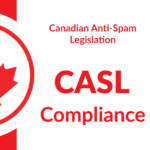The Canadian Anti-Spam Law (CASL) has yet to demonstrate its full impact and this should be a concern to many businesses in 2017.
In our experience many businesses have done the bare minimum to ensure that they are compliant with the Canadian Anti-Spam Law.
There are a few reasons for this but in general companies and the individuals responsible for CASL compliance (usually Marketers) do not believe that the prevention of CASL risk is a significant threat to their organization.
Why?
The enforcement of the Anti-Spam Law is in the hands of the Government.
- While there have been cases of companies having to answer for CASL violations the number of actual fines has been small.
- The government does not have the resources to aggressively pursue all CASL complaints and infractions.
- The government is not motivated or have good reason to substantially increase the number of CASL enforcements. To-date the few settlements and fines that have been handed out are clearly sending a message as to the serious nature of the Anti-Spam legislation on egregious offenders. But, the government does not want to appear that it is anti-business and restricting digital marketing commerce.
Businesses have become complacent.
The introduction of the Canadian Anti-Spam Law has had minimal impact on consumers as well as business because of the 3-year phased-in approach that the Government has put in place.
- All previously collected email contacts were ‘grandfathered’ in and given a 3-year implied consent status. Therefore, as of yet there has not been a substantial impact to businesses and marketing campaigns sending emails to their entire database.
- The lack of quantity and variety of CASL fines and penalties has given a false sense of security and lack of perceived risk to organizations.
This changes as of July 1st 2017.
Why businesses should take notice.
- The consumer right to private action will come into effect as of July 1st, 2017.
- Consumers have demonstrated that they are frustrated and complain about CASL risk violations in large numbers. Hundreds of thousands of complaints have been sent to the government since launch.
- Opportunistic and aggressive lawyers will see this as a new opportunity to make money.
- Smaller organizations that do not retain in-house lawyers should also be wary of legal costs on top of any money they are required to pay out for CASL violation settlements.
- Marketing is at risk – companies that have not been diligent in collecting ‘Express Consent’ from their previously collected or ‘Grandfathered’ email contacts will see a high number expire as of July 1st, 2017 which could impact revenue.
- Sales is at risk – Many businesses have not address CASL compliant risk and solution processes. It’s complicated and difficult for sales based businesses to stay compliant without an efficient solution that is adhered to.
This is just a quick summary of why CASL cannot be ignored and needs some serious attention in 2017. There are still several months before the right-to-consumer action and large number of ‘implied’ consents expire. You should re-visit and review how your organization manages CASL risk so that it does not fall victim to future consumer legal action.
Resources
For information and steps on what to do to get your organization CASL compliant please check out some our additional resources.
Top 3 risks of CASL compliance for Sales teams
Top 5 Tips for CASL Compliance
Free CASL Guide for Digital Marketers
If you would like a free consultation to review your Canadian Anti-Spam Law compliance requirements with an expert on our team please contact us.
Learn about how itracMarketer provides a turn-key CASL management cloud solution for marketing, sales teams and complete organizational email.
Leave A Comment